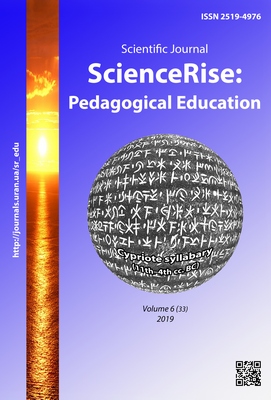Level characteristic of formation of didactic and practical abilities and skills of future special teachers to work in the conditions of educational inclusive space
DOI:
https://doi.org/10.15587/2519-4984.2019.185627Keywords:
inclusion, inclusive education, inclusive environment, competence, developing environmentAbstract
The article describes the levels of formation of didactic and practical skills of future special educators to work in an inclusive educational environment. The draft higher education standard of Ukraine is characterized for the first (bachelor's) level, bachelor's degree, in the field of knowledge 01 Education, specialties 016 Special education. It is possible to optimize the process of formation of the professional readiness of special educators for work in an inclusive educational space by including new disciplines in the curriculum, using innovative monitoring and educational technologies, which will increase the interest of special educators in activities in an inclusive educational space, and the formation of skills for independent knowledge accumulation and professional use.
We have developed experimental tasks for each of the identified criteria indicators in order to ascertain the level of readiness of future correctional teachers to work in inclusive educational institutions. These are such tasks: tests (on readiness for innovative activity, purposefulness, etc.), analysis of problem situations, storytelling, discussions, reports on the scientific and practical seminar “Trends in the development of inclusive education”, round table “Exchange of work experience”, pedagogical games "Methodology of work in inclusion", "Who is better?", analysis of problem pedagogical situations and so on.
The analysis of the research results allowed us to conclude, that it is necessary to develop didactic knowledge and practical skills of correctional teachers to work in an inclusive educational environment. The study allowed to determine the features of the preparation of special educators for work in an inclusive educational space.
The study allowed to determine the features of the preparation of future correctional teachers for work in an inclusive educational space. Among them: insufficient motivation to work in inclusive institutions, emotional instability; the lack of systematic didactic and practical training of future correctional teachers for work in inclusive classes, the substantial limitations of the modules of academic disciplines that do not contain the bases of didactic and practical training of future correctional teachers for work in an educational inclusive space, insufficient material and technical support, etc
References
- Broderick, A., Mehta-Parekh, H., Reid, D. K. (2005). Differentiating Instruction for Disabled Students in Inclusive Classrooms. Theory Into Practice, 44 (3), 194–202. doi: http://doi.org/10.1207/s15430421tip4403_3
- Hodkinson, A. (2010). Inclusive and special education in the English educational system: historical perspectives, recent developments and future challenges. Research in Education, 73, 15–29.
- Mattson, E.-H., Hansen, A.-M. (2009). Inclusive and exclusive education in Sweden: principals opinions and experiences. European Journal of Special Needs Education, 24 (4), 34–56. doi: http://doi.org/10.1080/08856250903223112
- Budiak, L. V. (2009). Osnovy inkliuzyvnoi osvity. Cherkasy: Vyd. ChNU, 90.
- Davydenko, H. V. (2015). Umovy vprovadzhennia inkliuzyvnoho navchannia u vyshchykh navchalnykh zakladakh Yevropeiskoho Soiuzu (psykholoho-mentalnyi, orhanizatsiinyi ta sotsialnyi aspekty). Vinnytsia: TOV «Nilan-LTD», 102.
- Martynchuk, O. V. (2018). Pidhotovka fakhivtsiv zi spetsialnoi osvity do profesiinoi diialnosti v inkliuzyvnomu osvitnomu seredovyshchi. Kyiv: Tsentr uchbovoi literatury, 430.
- Savinova, N. V. (2016). Problemy pidhotovky maibutnikh korektsiinykh pedahohiv do roboty v umovakh inkliuzyvnoho navchalnoho zakladu. Aktualni problemy korektsiinoi osvity. Available at: http://aqce.com.ua/download/publications/96/69.pdf/ Last accessed: 18.06.2018
- Sheremet, M. K., Pakhomova, N. H., Myronova, S. P., Fedorenko, S. V. (2017). Standart vyshchoi osvity Ukrainy za druhym (mahisterskym) rivnem, stupenem mahistra, z haluzi znan 01 Osvita, spetsialnosti 016 Spetsialna osvita. Kyiv, 20.
- Sheremet, M. K., Pakhomova, N. H., Myronova, S. P., Fedorenko, S. V. (2017). Standart vyshchoi osvity Ukrainy za pershym (bakalavrskym) rivnem, stupenem bakalavra, z haluzi znan 01 Osvita, spetsialnosti 016 Spetsialna osvita. Kyiv, 17.
- Berehova, M. (2019). Levels of formation of gnostic-technological competence of future speech therapist to work in the conditions of inclusive education. ScienceRise: Pedagogical Education, 1 (28), 9–12. doi: http://doi.org/10.15587/2519-4984.2019.155002
- Berehova, M. I., Savinova, N. V. (2018). Rivni sformovanosti motyvatsiino-emotsiinoi hotovnosti maibutnikh lohopediv do roboty v umovakh inkliuzyvnoho navchannia. Humanitarium. Pedahohika, 43 (2), 121–130.
- Berehova, M. I. (2019). Dydaktyko-praktychna pidhotovka maibutnikh korektsiinykh pedahohiv do roboty v umovakh inkliuzyvnoho osvitnoho prostoru. Kyiv: Natsionalnyi pedahohichnyi universytet imeni M. P. Drahomanova, 19. Available at: https://npu.edu.ua/images/file/vidil_aspirant/avtoref/%D0%94_26.053.23/Beregova.pdf
Downloads
Published
How to Cite
Issue
Section
License
Copyright (c) 2019 Natalia Savinova, Mariya Berehova

This work is licensed under a Creative Commons Attribution 4.0 International License.
Our journal abides by the Creative Commons CC BY copyright rights and permissions for open access journals.
Authors, who are published in this journal, agree to the following conditions:
1. The authors reserve the right to authorship of the work and pass the first publication right of this work to the journal under the terms of a Creative Commons CC BY, which allows others to freely distribute the published research with the obligatory reference to the authors of the original work and the first publication of the work in this journal.
2. The authors have the right to conclude separate supplement agreements that relate to non-exclusive work distribution in the form in which it has been published by the journal (for example, to upload the work to the online storage of the journal or publish it as part of a monograph), provided that the reference to the first publication of the work in this journal is included.







